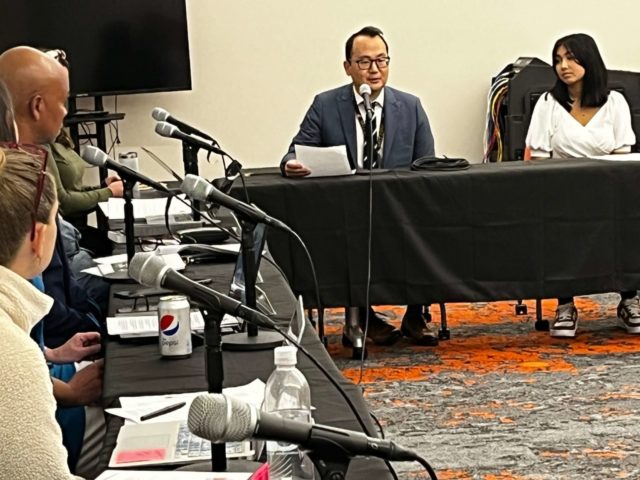The Verona Area School District Board of Education unanimously approved a resolution Monday committing to teaching Asian American and Pacific Islander (AAPI) history and culture across the curriculum.
Verona becomes the first district in the state to adopt the language and spirit of a Wisconsin Association of School Board resolution calling for schools to incorporate more representation of AAPI people in history, literature and other areas.
“This resolution is a way for Asian American students to feel heard,” said Angela Miller, a junior at Verona High School and co-president of the Asian Student Alliance. “It’s a way for us to be seen in our community, not only our school community, but our actual community. It means so much to me that little kids now get to know about what Asian Americans have done for our country in our history, and that we’re not alone, and that we matter and that our voices and who we are and what we’ve done matters.”
Miller said the resolution is especially important now.
“We’ve always been the group that’s been pushed aside, that’s been silenced. And I think recently, since the start of COVID-19, with all the microaggressions that have happened, I think that’s what’s really brought us to light to (say), ‘Hey, we are here, we have feelings, we matter,’” she said.
“Symbols matter. Symbols are really important,” said Kabby Hong, an English teacher at Verona High School and Wisconsin’s 2021 Teacher of the Year. “The symbolism of a district with just four percent AAPI population, publicly affirming and saying that Asian American history, identity and culture are vital for all kids, I think is really affirming and incredibly important.”
Hong said there are gaps in knowledge of Asian American history among students and adults, especially about historical topics like the internment of Japanese Americans during the Second World War.
“What’s been shocking to me is how many people didn’t know about the Japanese internment,” he said. “In discussing with my own colleagues, they were not aware of the internment of Japanese Americans. Asian Americans are so invisible, that even among educated professional teachers, there are tremendous gaps. I think that shows you how important it is for boards and superintendents to really publicly affirm that this is an issue that is important.”
AAPI Coalition of Wisconsin Chair Jessica Boling added that the important contributions of Hmong Americans, many of whom came to the United States as refugees in the mid-1970s after supporting the American military in the Vietnam War. Wisconsin has the third-largest Hmong population in the US after California and Minnesota.
“People don’t necessarily know, and they’re not necessarily fully honored as veterans,” Boling said. I think that would be nice … getting people to understand that and also for the Hmong community to feel like they’re integrated and they are part of Wisconsin history. (The Hmong migration) is a major milestone in our history.”
Boling noted that state law requires education on the history and culture of Black Americans, Latino Americans and Indigenous People, but not Asian Americans and Pacific Islanders. A bill championed by State Rep. Francesca Hong to require AAPI education has not moved out of committee.
Superintendent Dr. Tremayne Clardy said the actual curriculum development work will begin with input from students.
“The last thing you want to do is build something that students feel isn’t true representation,” he said. “We center our student voice in all of our leadership steps, and our next step is bringing those voices to the table to identify, what does this really look like?”
Teacher Kabby Hong said the resolution is just the beginning.
“What the resolution basically says tonight is the start of our work,” he said. “This is not going to happen overnight. It’s going to take time, it’s going to take months and years. But the resolution tonight is a public starting point for the work that it takes to really integrate Asian American identity into the curriculum for all kids.”
“I just think it’s important for everyone to know that Asian Americans are still here,” Miller said. “You can’t silence us. It may seem like you can, but we always find a way to get our voices heard. Because we matter.”


































